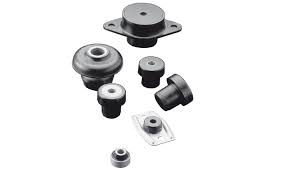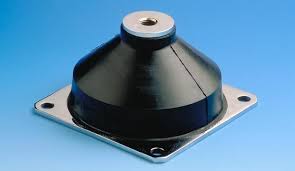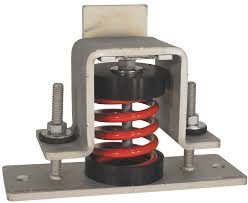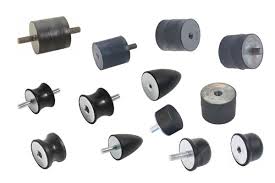HVAC rubber isolators are essential components in HVAC systems, helping to maximize efficiency and prevent excessive vibration. By incorporating high-quality rubber isolators into HVAC equipment, facilities can minimize noise, extend the lifespan of their systems, and improve overall performance. In this article, we will explore the benefits of using HVAC rubber isolators and how they can help maximize efficiency in HVAC systems.
HVAC rubber isolators are designed to reduce noise and vibration in heating, ventilation, and air conditioning systems. By minimizing these disturbances, they help to maximize the efficiency of the HVAC system. This is because excessive vibration and noise can cause mechanical components to wear out more quickly, leading to increased energy consumption and reduced performance. Rubber isolators also help to improve indoor air quality by reducing the transmission of noise and vibration through the building structure. Additionally, they can help to extend the lifespan of HVAC equipment, resulting in cost savings and improved overall system efficiency.
HVAC rubber isolators are used to reduce noise and vibration in heating, ventilation, and air conditioning systems. By minimizing these disturbances, they help to maximize system efficiency. Excessive vibration and noise can cause mechanical components to wear out faster, leading to increased energy consumption. Rubber isolators also improve indoor air quality by reducing the transmission of noise and vibration through the building structure. They can extend the lifespan of HVAC equipment, resulting in cost savings and improved overall system efficiency.
The Importance of HVAC Rubber Isolators in Reducing Vibration

HVAC rubber isolators are an important component in reducing vibration in heating, ventilation, and air conditioning systems. These isolators are designed to absorb and dampen the vibration and noise generated by the operation of HVAC equipment. By providing a cushioned barrier between the HVAC equipment and the building structure, rubber isolators help to prevent the transmission of vibration and noise to the surrounding environment. This is important for maintaining a comfortable and quiet indoor environment, as well as for preventing damage to the building's structural integrity. In addition to improving indoor air quality and reducing noise pollution, HVAC rubber isolators also contribute to the longevity and performance of the HVAC system itself. By reducing the stress and wear on system components caused by excessive vibration, rubber isolators help to extend the lifespan of equipment and minimize the need for repairs or replacements. Overall, the use of HVAC rubber isolators is crucial for ensuring the efficient and effective operation of heating, ventilation, and air conditioning systems while also minimizing their impact on building occupants and nearby surroundings.
How HVAC Rubber Isolators Improve System Efficiency

HVAC rubber isolators improve system efficiency by reducing vibration and noise transmission from the HVAC equipment to the building structure. This helps to protect the building from potential damage caused by excessive vibration, as well as improving occupant comfort by minimizing noise. Additionally, rubber isolators can also extend the lifespan of HVAC equipment by reducing wear and tear on the system components. This all leads to improved overall system efficiency and performance.
Choosing the Right HVAC Rubber Isolators for Your Unit
building vibration isolation

When choosing the right HVAC rubber isolators for your unit, it's important to consider factors such as the weight and size of the unit, the amount of vibration it produces, and the level of noise reduction needed. It's also important to consider the environmental conditions the isolators will be exposed to, such as temperature and humidity levels. Additionally, be sure to consider the compatibility of the isolators with your specific HVAC unit and any building codes or regulations that may apply. It's helpful to consult with a professional to ensure you select the right isolators for your unit.
Common Issues with HVAC Rubber Isolators and How to Resolve Them

Common issues with HVAC rubber isolators include cracking, wearing out, and disintegration due to prolonged exposure to environmental factors such as heat, chemicals, and/or moisture. These issues can lead to reduced performance, increased vibrations, and noisy operation of the HVAC system. To resolve these issues, it is important to regularly inspect the rubber isolators for signs of wear and tear. If any isolators are found to be damaged or deteriorating, they should be replaced immediately with new ones that are designed to handle the specific load and environmental conditions of the HVAC system. Additionally, it is essential to ensure that the isolators are properly installed and maintained to prevent premature wear and tear. Using protective coatings or barriers can also help to prolong the lifespan of the rubber isolators. Regular cleaning and lubrication can further help in preventing damage and maintaining the isolators in good condition.
The Benefits of Upgrading to High-Quality HVAC Rubber Isolators
Upgrading to high-quality HVAC rubber isolators can provide numerous benefits for your HVAC system. These isolators can help reduce vibration and noise, improve system stability, and extend the lifespan of your equipment. By installing high-quality isolators, you can also minimize the risk of equipment damage and reduce the need for frequent maintenance and repairs. Additionally, these isolators can improve overall system performance and energy efficiency, saving you money on operating costs in the long run. Overall, upgrading to high-quality HVAC rubber isolators can be a valuable investment for your HVAC system.
Understanding the Role of HVAC Rubber Isolators in Noise Reduction
HVAC rubber isolators play a crucial role in noise reduction by isolating the vibrations generated by the HVAC system from the surrounding structure. This helps in preventing the transmission of noise and vibrations to the building, leading to a quieter and more comfortable environment. These isolators are designed to absorb and dampen the vibrations, reducing the overall sound levels produced by the HVAC system. Additionally, they also help in extending the lifespan of the equipment by minimizing the impact of vibrations. Overall, understanding the role of HVAC rubber isolators is essential in creating a more peaceful and efficient indoor environment.
The Impact of HVAC Rubber Isolators on Equipment Longevity
HVAC rubber isolators play a crucial role in preserving equipment longevity by reducing vibration and noise levels. These isolators effectively absorb and isolate the vibration produced by HVAC equipment, thereby extending the lifespan of the system. By minimizing the impact of vibration, rubber isolators help prevent wear and tear on mechanical components, increasing overall equipment reliability and reducing the need for frequent repairs or replacements. Additionally, the use of rubber isolators can contribute to improved energy efficiency and performance of HVAC systems by maintaining proper alignment and reducing excessive movement. Overall, the incorporation of HVAC rubber isolators can significantly enhance the longevity and operational efficiency of HVAC equipment.
Installing and Maintaining HVAC Rubber Isolators for Optimal Performance
hvac vibration isolators residential
Installing and maintaining HVAC rubber isolators is crucial for optimal performance. These isolators help to reduce noise and vibration in HVAC systems, providing a more comfortable indoor environment. During installation, it is important to ensure that the rubber isolators are properly sized and positioned to effectively absorb and isolate vibrations. Proper alignment and secure attachment to the equipment is necessary to prevent any issues with performance. Regular maintenance of rubber isolators is also essential. This includes inspecting them for signs of wear or damage and replacing them as needed. Keeping the isolators clean and free of dirt and debris will help to prolong their lifespan and maintain their effectiveness. Additionally, periodic checks should be performed to ensure that the isolators are providing the level of vibration isolation required for optimal HVAC system performance. This may involve monitoring vibration levels and making adjustments as necessary. By properly installing and maintaining HVAC rubber isolators, you can ensure that your system operates at its best, minimizing noise and vibration for a more comfortable indoor environment.
In conclusion, HVAC rubber isolators play a crucial role in maximizing the efficiency of heating, ventilation, and air conditioning systems. By effectively reducing vibrations and noise, these isolators help to extend the lifespan of HVAC equipment and improve energy efficiency. Investing in high-quality rubber isolators can result in significant cost savings and a more comfortable indoor environment. Therefore, it is essential for HVAC professionals to prioritize the use of rubber isolators in their systems for optimal performance and longevity.
See also
https://www.globalindustrial.com/t/material-handling/vibration-dampers/vibration-isolators https://www.paulstra-industry.com/en/products/vibration-isolation